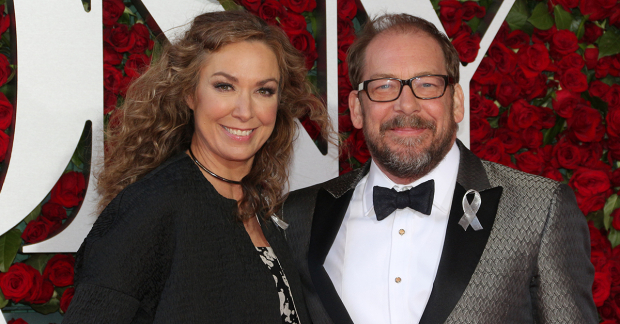Interview: Elizabeth Marvel and Bill Camp on the Pleasure and Pain of Long Day's Journey Into Night
The married actors star in Audible’s new revival of Eugene O’Neill’s epic, directed by Robert O’Hara.
Long Day's Journey Into Night, Eugene O'Neill's deeply personal, monstrously taxing, semiautobiographical drama, is returning to New York City this month, in a production by Audible at the Minetta Lane Theatre. Director Robert O'Hara has trimmed this three-, sometimes four-hour epic into a taut 100 minutes and resets it during the pandemic lockdown months of 2020 as the Tyrone family falls into a cycle of Covid-related self-destruction.
At the heart of the enterprise are married actors Elizabeth Marvel and Bill Camp, who take on the parental roles of Mary and James Tyrone (Ato Blankson-Wood and Jason Bowen round out the cast as their sons). Here, Marvel and Camp share their personal histories with the work, and tell us why being married in real life makes a play of this nature much easier.

(© David Gordon)
These interviews have been condensed and edited for clarity.
Long Day's Journey Into Night is either a play an actor dreams of or is terrified by. Where are you in that spectrum?
Elizabeth Marvel: One in one hand and one in the other. But I definitely have dreamed of it. One of the first plays that got me to want to be an actor was A Touch of the Poet, which I got to see with Vanessa Redgrave after I had been following the Grateful Dead around and landed in London. I was like, "Whatever that is, that is what I want to do." So that began my journey with theater. And then I auditioned for Juilliard with a piece from Strange Interlude, which is not a common choice, and then one of the first jobs I got was A Touch of the Poet. So I have been in love with O'Neill for my whole life, and this has been a dream I have chewed on for a long time.
Bill Camp: I did this play a long time ago at American Repertory Theatre. It was a pretty straightforward, traditional production, and I played Jamie. I never really thought I would go through the gauntlet again. My perspective at that time was very different, and so the way that I approached that role is very different from the way I look at the the world now. But it's exhausting. It's really emotionally taxing and psychically very painful, which is what I think he intended.
I imagine that playing roles as vulnerable as Mary and James is helped greatly by your being a married couple.
Elizabeth: It surely is.
Bill: It's way easier, because we have an established trust, a 30-year foundation.
Elizabeth: And it's a story about a very long, loving marriage, so we just look at each other and have all that history. It's a great shortcut.
Bill: It's hard to articulate whatever that bond is that happens in a marriage. But I can just sort of watch her and trust her and know what's going on. You have the symbiotic understanding that doesn't require the spoken word. It can come with our eyes or our physical body language. I'm always on safe grounds.
Elizabeth: I've been talking to Bill about the play for a long time. When this presented itself, it was the perfect opportunity, because the Audible model is not a six-month commitment. It's something we could manage and be parents, which is a tall order. So we were able to make it work. And, you know, he's my favorite actor. There's no one in the world I'd rather do this play with.
What does it mean to both of you that this production is being recorded and released by Audible?
Bill: I'm very honored.
Elizabeth: It's such a democratic approach to the arts, to make it accessible for everyone. The same thing is happening with education. And it's not about simplifying or dumbing down — it's more complicated, more demanding, and in some ways, more rigorous, but it's available to everyone. And that is so moving and so important. I'm so grateful for it because it feels like an act of service. It's not an act of ego.
Bill: I was having a conversation with a friend who listens to a lot of classic radio, which is something we also do as a family. It's a valuable piece in the chain of great plays and great stories. And now, maybe it'll become a more common thing where we cast people to preserve masterpiece plays. It's quite important and essential that it be done, so I praise Audible for doing it and it's an honor to be part of something that will last.








